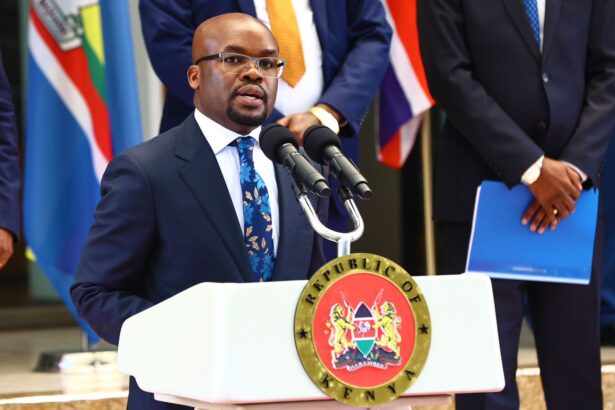NAIROBI Kenya June 19 -Non-Governmental Organisations (NGOs) spent a total of Sh.197.9 billion on projects last financial year, according to an annual report.
The Annual NGO Sector Report 2022/2023 launched yesterday indicates that the investment in various charitable areas increased by Sh12.4 billion compared to the previous year.
The funds were allocated to various sectors, including health, education, welfare and agriculture, as well as water and sanitation, among others.
The NGOs allocated a sum of Sh141.79 billion for project implementation during the period. Of this, Sh109.4 billion (77 percent) was spent within Kenya and Sh32.38 billion (23 percent) expended in other countries.
Most of the NGO funds were spent on Health (Sh36.5 billion), children (Sh12.19 billion), relief and disaster management (11.18 billion), multi-sectoral (Sh10.01 billion, and Education (Sh7.73 billion).
Others are environment (Sh6.17 billion), water and sanitation (Sh5.54 billion), agriculture (Sh4.80 billion), youth (Sh2.89), and governance (Sh2.65 billion).
“Religion, ICT, and Advocacy sectors recorded significant growth, while sectors such as Trade and Drug and Alcohol Addiction received less attention,” the reports states.
In the year under review, according to the report, Nairobi County was the most preferred location for newly registered NGOs to operate (277 NGOs), followed by Kisumu (105 NGOs) and Kiambu (93 NGOs).
Nairobi County also had the highest number of projects and programmes implemented (2,525), followed by Kisumu with (1,035), Nakuru (881), and Kiambu (836).
The leading international NGOs in the utilization of funds of projects in the country are World Vision Kenya (Sh6.8 billion), Amref Health Africa in Kenya (Sh6.39 billion), and Compassion International Inc (Sh2.39 billion), among others.
Internal Security and National Administration Principal Secretary, Dr Raymond Omollo has lauded the partnership between NGOs – now called public benefit organisations (PBOs) following the operationalisation of PBO Act, 2013 last month –and the Government on development issues.
In a speech read on his behalf by Principal Administrative Secretary Njenga Miiri during the launch of NGOs week 2024, at KICC, the PS said local and international NGOs provided emergency relief, including food, clean water, medical supplies, hygiene kits, education materials and temporary shelter to affected communities.
The NGOs Week is an event aimed at providing a platform for charitable organisations to showcase what they do and share experiences.
This year’s NGOs Week theme “Building Synergy for a Sustainable Future” which is a rallying call on all non-profits operated for charitable purposes to work together with stakeholders, including the Government to create more impact in the society.
“The PBO sector has have long been recognised as crucial actors in driving sustainable development, and working at the forefront to address pressing societal challenges,” he said.
The PS particularly praised NGOs for working with the National Government Administrative Officers (NGAOs) to deal with the recent floods that affected various parts of the country.
Dr. Omollo, however, said he was concerned that only 2,828 out of 12,000 registered NGOs filed their annual reports as required by law.
“Despite having over 10,000 active NGOs, the actual contribution of this sector to the economy remains unclear due to these reporting deficiencies,” he noted.
As a result, the PS directed the PBO Authority to take firm action against the noncompliant PBOs as per the law, including deregistering those that had not filed their reports for long.
He said the Government operationalised the PBO Act as part of its commitment to provide an enabling environment for the non-state actors to operate effectively and enjoy the civic rights and freedoms guaranteed by the Constitution.
The NGOs have also been challenged to embrace transparency in their funding sources as well as expenditure.
The implementation of the PBO Act requires active participation of all stakeholders.
“The Act provides a broader civic space and is arguably one of the most progressive legislation in guaranteeing the freedom of association and assembly as provided for in Article 36 of our Constitution,” Dr Omollo said.
The law provides a framework for collaboration and a robust framework for PBO registration and regulation. It enhances transparency, accountability, and efficiency in PBOs and could ultimately promote sustainable programmes.
The PBO Authority chairman, Mwambu Mabongah, has also urged charitable organisations to redouble their efforts in supporting the needy and vulnerable.
He added that the would work with all stakeholders to implement the new law.
In the previous Financial year, 2021/2022, the organizations Sh175.9 billion to the economy and employed 71,096 people. This was a 27 percent increase in financial receipts, from Sh138.6 billion in the previous financial year, 2020/2021.
Want to send us a story? Contact Shahidi News Tel: +254115512797 (Mobile & WhatsApp)


